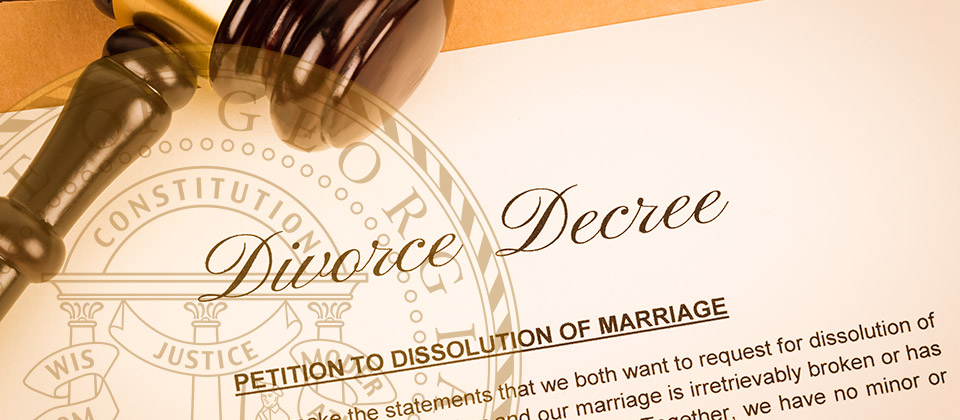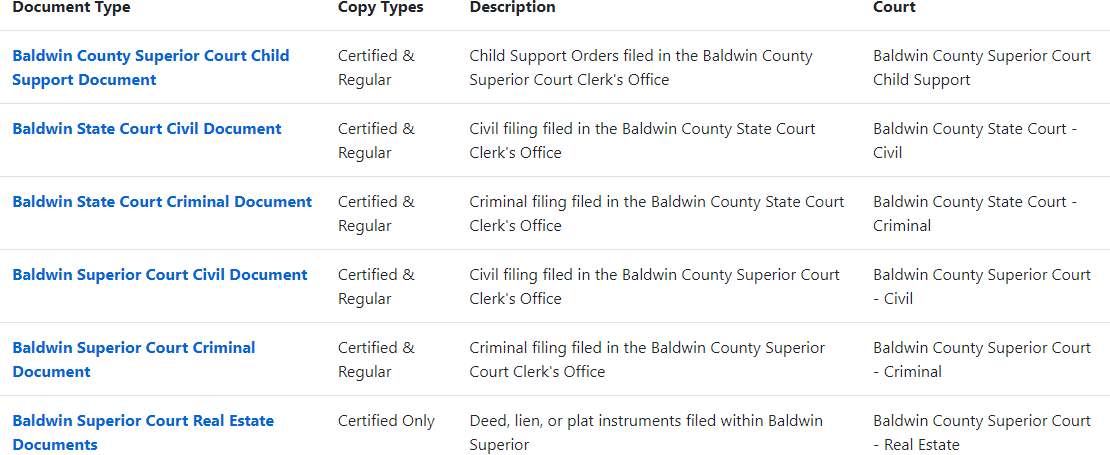Guide to Georgia Divorce Records

While moving on may be the first thing you want to do following a divorce, make sure you do not do so without copies of your Georgia divorce records. Sometimes, you will need copies, such as when you want to revert to your previous last name, contesting alimony or child support, or when remarrying.
Many tasks for which we need divorce records are time-sensitive or things we must finish before getting on with our lives. Following the correct process helps you avoid excess processing time when you need your records immediately.
What are Georgia Divorce Records?
Georgia divorce records meticulously document the reasons, evidence, and final terms of a marriage's end. It's commonly used as proof for various financial and governmental processes but is also meant to be a point of reference in case either spouse wants to contest the terms in the future.
As such, these records store considerable financial and personal information on both spouses and any dependents affected by the event. However, not all situations require the entire divorce record.
If you only need to confirm a divorce for personal reasons, the Georgia Vital Records Department can give an informal guarantee. However, applicants requiring the complete case file can only find them through the county's Superior Court that finalized the divorce.
What's Inside the Divorce Record?

Every divorce record will be a little different, just like how every marriage has its quirks. One couple might fight over the beach house while another struggles with dividing their debt. What's fought over and who it goes to is decided by dozens, if not hundreds, of documents. However, nearly all divorce records will include some or all of the following aspects:
- Final Judgment: In Georgia, this order means no issues are left to be resolved and constitutes the court's final ruling. It may be appealed within 30 days of signing.
- Affidavit: Family Courts demand both spouses submit a complete audit of their finances. This keeps the process more transparent and typically includes details about joint and individually owned accounts, life insurance, tax returns, and debts.
- Spousal Support: Also called Alimony, this refers to one spouse's economic obligation to the other. Alimony is given "as necessary" in Georgia and is only meant to last until the other party is self-sufficient. Georgia does not put a limit on the duration of Alimony, and it's defined on a case-by-case basis.
- Child Custody: These documents cover minute details on child custody and support arrangements. Standard inclusions dictate which parent is the primary caretaker and the extent of visitation rights.
- Division of Assets and Debt: Georgia focuses on equitable distribution of both assets and debts. Generally, the higher-earning spouse takes up to two-thirds of positive and negative assets; the rest goes to the lower-earner.
Omissions and Errors in Divorce Records
Numerous events unfold during a divorce, and some matters can slip by unnoticed. If an asset is missing from both spouse's affidavits, it's considered an undivided asset and is typically kept by the current holder.
However, if the other spouse realizes this mistake, they can apply for an appeal and attempt to include the asset in the original deal. Doing so requires them to review the divorce record and make the case that they should've originally received it.
Rather than forgotten property, the supporting spouse should carefully look through all financial obligations. A single typo could cost tens of thousands since spousal support and child custody payments may stretch for decades.
Divorce Statistics in the State

Monitoring divorce statistics is critical to grasping societal patterns and shaping family law. These figures offer a glimpse into the struggles of the modern family in a state and how it's responding to recent legislation.
Some of the most pertinent divorce statistics include:
- Divorce Rate: Georgia has a divorce rate of 2.2 per thousand people, giving it one of the lowest divorce rates among all states. It's tied for 7th place alongside Louisiana, New Jersey, and New York.
- Most Common Divorcing Year: In Georgia, divorce is most likely to happen within the first four years of marriage. The number of divorcing couples decreases each subsequent year into the union before stagnating at roughly 20 years.
- Who Initiates Divorces: Like in most states, women are initiating the lion's share of divorces. Many attribute this number to greater economic freedom and options on the wife's side.
- Average Length of Marriages: According to CNBC, Georgia has some of the shortest marriages in the country. The median length of a marriage in Georgia is 18.8 years, which puts it a full year behind the national average.
How to Find Georgia Divorce Records

The first site you'll find when ordering Georgia divorce records is the . Vital Records request page. There are several options available, but let us save you some time. The Georgia Vital Records Department does NOT provide divorce records, divorce decrees, or divorce verification letters.
The only divorce service provided by the state department is a database search. The only reason to contact this office is if you don't know which county maintains your files.
However, Georgia does have a hidden gem when it comes to online ordering. The Peach State recently rolled out an eCertification Portal, and it's one of the most intuitive processes offered by any state.
All you have to do is create an account and choose the county where the divorce happened. Afterward, you will see a table like this.

Anyone searching for divorce records in Georgia will click on the link called "X Superior Court Civil Document." After that, you just fill out a form and submit the request.

You will need to know specific information for the form, including the Case Number and party names, as they're recorded in the records. You can look it up through the Peach Court service if you don't know the case number.
The eCertification Portal isn't perfect. The available records are incomplete; not all county courts have opted for the service. Here is a list of all the participating counties and which court documents they have available.
Offline Ordering
If the eCertification Portal doesn't work for your situation, the old methods still work. Certified copies of divorce records are found at the Superior Courts of the county that handled the case. The required forms will vary between counties, but the fields typically remain the same. You'll need to know the following:
- Names of the spouses before and after divorce
- Date of the divorce
- Case number
Some courts allow walk-ins, while others only reply to written requests. Gwinnett County only accepts orders by mail despite being the second-largest county in Georgia. This lack of consistency can make it very confusing to know your next steps, so it's best to call the Superior Courts ahead of time and ask about their specific process.
You should ask the following questions:
- Where can I find the request form?
- How much is the fee, and to whom do I make my check payable?
- Do I need to attach a copy of my photo ID?
These questions will ensure that you follow their procedures and reduce the risk of being ignored.
Georgia Circuit Court Clerk Contact Directory
Navigating government websites is never easy, and calling the wrong place will often leave you tossed around departments for hours. For the highest likelihood of reaching the right people, we've provided the official pages for the County Courts of Georgia's most populous counties.
| County | Phone Number |
|---|---|
| Fulton County | (404) 613-4583 |
| Gwinnett County | (770) 822-8100 |
| Cobb County | (770) 528-1921 |
| DeKalb County | (404) 371-2601 |
| Chatham County | (912) 652-7264 |
| Clayton County | (770) 477-3301 |
| Cherokee County | (678) 493-6160 |
| Forsyth County | (770) 886-2839 |
| Henry County | (770) 288-7600 |
FAQ on Divorce Records in Georgia
What's the difference between a divorce record and confirmation?
The Georgia Vital Statistics department can send confirmation that a divorce exists in government records. They can do so verbally or through a letter. However, this confirmation isn't official and can't be used as definitive proof for governmental or financial procedures.
Certified divorce records have their legitimacy guaranteed by the government. The decree is undeniable proof of divorce in any legal or financial process. Additionally, divorce records are far more comprehensive and contain documentation from every divorce process step.
Do I need my divorce records to remarry in Georgia?
Yes, you must have a certified divorce decree when applying for a new marriage license in Georgia. This prevents anybody from entering another union before a final judgment is made on their previous marriage. However, you don't need the entire record. Requesting a copy of the divorce decree will be enough.
Do I have to pay a fee to get my divorce record in Georgia?
The eCertification portal charges $2.50 for the first page of your record and $0.50 for each additional page. A divorce decree is typically a single page, but the entire case file can be significantly longer.
There's also a credit card processing fee equivalent to 2.5% of the total cost of your order.
How long will it take to get my divorce record?
You can expect same-day service if you go to the courts in person. Of course, this timeframe depends on you having the correct information prepared. Any errors on your part could extend the process by weeks.
The eCertification Portal has similar processing times to mail-in orders. The request must still be processed by court employees and sent out through US mail. The average wait time with these methods is anywhere from 8 to 10 weeks.
Can anyone request a divorce record in Georgia?
Divorce records are publicly available in Georgia. Anyone can search through these records to request details of a divorce. The order forms do not require photo identification or permission from the divorced parties.
However, Family Courts in Georgia often agree to seal records containing private personal or proprietary business details. Individuals wanting this service must petition the courts to prove the risk the information poses to their safety.
